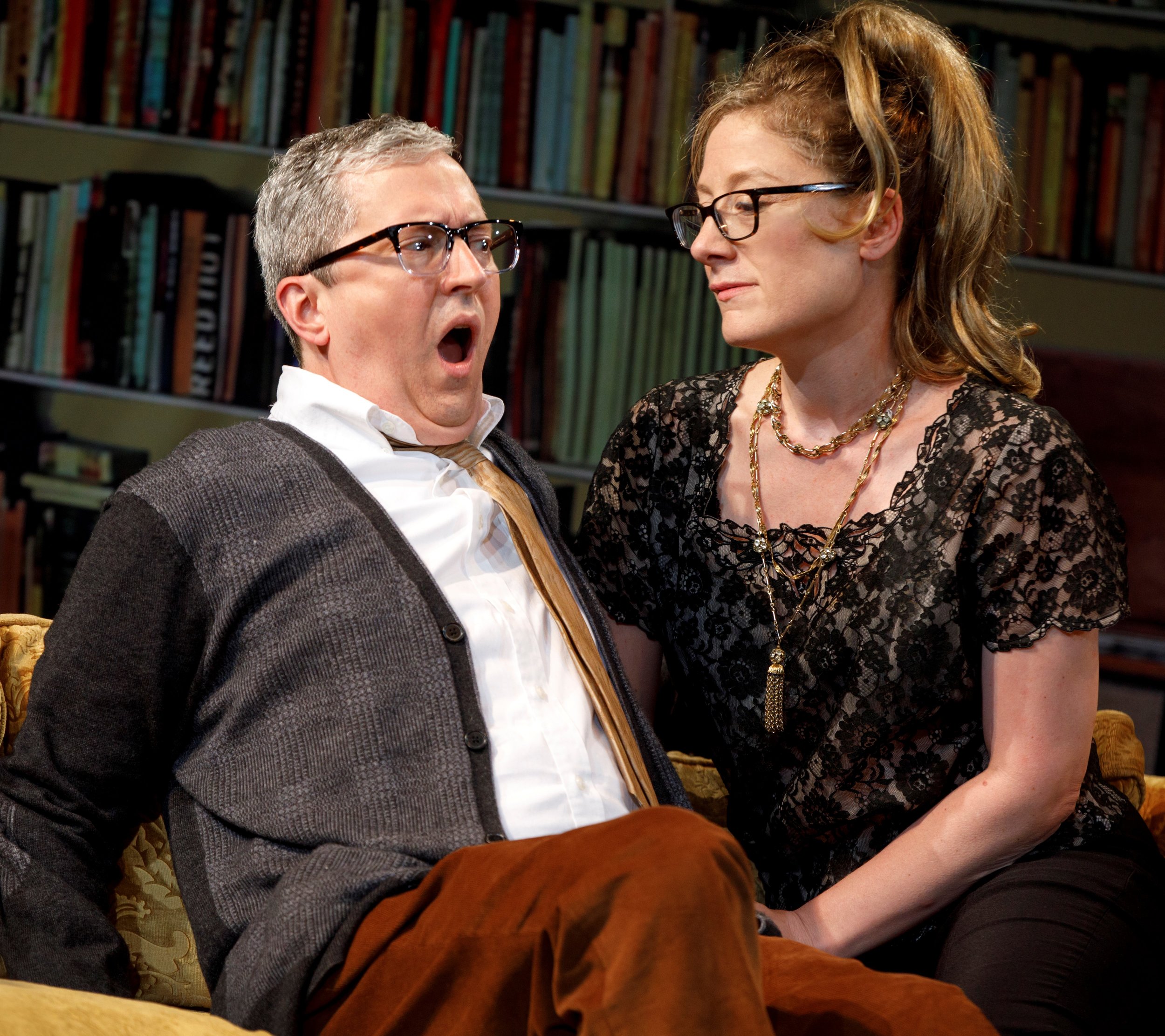Elevator Repair Service (ERS), the adventurous downtown troupe known for theatrical adaptations of iconic modernist works, is parodying Edward Albee and Tennessee Williams in a new play by Kate Scelsa that has the cleverest title in town—Everyone’s Fine with Virginia Woolf. This production is directed at breakneck speed by the company’s founder, John Collins. It features visuals by Louisa Thompson (scenery), Amanda Villalobos (properties), and Kaye Voyce (costumes) that give the proceedings the kitsch-cluttered aesthetic that’s an ERS signature.
The good news is that Everyone’s Fine is briefer and more engaging than Gatz, the theatrical endurance test that is the company’s most famous, much revived hit. Gatz, which will be back in New York in January, is a camped-up, semi-dramatized, word-for-word presentation of The Great Gatsby that lasts seven hours with a dinner break. Everyone’s Fine, by contrast, is a zany mash-up of literary pastiche, pop cultural references, and slapstick, in which Scelsa purloins—or, better, “hijacks”—the four characters of Albee’s Who’s Afraid of Virginia Woolf, adding a fifth of her own devising, and unleashes her ferocious narrative imagination for a fleet 70 minutes.
Vin Knight and Annie McNamara as George and Martha in Kate Scelsa's Everyone's Fine with Virginia Woolf. Above: April Matthis as Honey and Mike Iveson as Nick, with McNamara. Photos by Joan Marcus.
As in Albee’s original, Nick (Mike Iveson) and Honey (April Matthis), newcomers at a northeastern liberal arts college, are paying a late-night call on faculty veteran George (Vin Knight) and his wife Martha (Annie McNamara). The two couples have just met at a reception for first-year professors and their spouses. What Honey and Nick expect will be a quick nightcap turns into a three-act Walpurgisnacht of “fun and games” revealing—at an accelerated pace in Scelsa’s version—the motivations beneath each character’s illusions and pretenses.
The initial sequence of Everyone’s Fine tracks the action of Who’s Afraid, incorporating a sizable number of Albeean remarks and phrases, though always with a difference. Scelsa, who’s an ERS actor as well as a playwright and novelist, has appended 3½ pages of footnotes to her script, acknowledging sources and asserting her purely parodic intentions, presumably to ward off litigation by the Albee and Williams estates.
“What a dump,” brays George, as he and Martha arrive home from the faculty reception in Everyone’s Fine. That “dump” remark, of course, is Martha’s indelible entrance line in the original play, as well as being Albee’s campy allusion to two Hollywood films of the 1940s. Scelsa is making it clear with her play’s very first line that, in this 2018 version of the George-and-Martha ménage, things aren’t going to be what we expect. In a matter of minutes, it’s beyond question that things aren’t merely different but downright topsy-turvy. George and Nick are gay; Martha swings both ways, though she prefers women. And Honey, sex-starved and further frustrated by the “post-irony suburban nightmare” of the college town in which she and Nick have settled, flees midway through the play.
Lindsay Hockaday, as Carmilla the vampire graduate student, and Knight in Everyone's Fine with Virginia Woolf.
Scelsa’s fifth character is Carmilla (Lindsay Hockaday), a feminist vampire and Ph.D. candidate (presumably in theater studies), who seemingly materializes from the fan fiction that Nick writes. Carmilla “feeds off neuroses” rather than blood. Among the partyers at George and Martha’s house, she has abundant psychological maladjustments from which to choose; but her mission is to guide George—who, having channeled both Blanche DuBois and Maggie the Cat in earlier scenes, is now garbed as Blanche—on the journey to hell. (Yes, the final act of Scelsa’s play is set on the Road to Hell.)
According to a loose translation of Saint Bernard of Clairvaux, the road to hell is paved with good intentions. Scelsa’s parodic trip to the underworld may have honest feminist, literary-critical objectives; but Everyone’s Fine, funny as it is, does little more than ridicule a few highly mannered leading female characters (and a couple of males, as well), fabricated by two gay male literary geniuses. Perhaps those distinctive characters seem foreign or funny (either funny-peculiar or funny-ha-ha) to audiences born too late to recall the context in which they were imagined. Well, laugh all you want (and there’s plenty of cause for laughter in Everyone’s Fine)—those women are among the most enduring creations of world drama.
Everyone’s Fine with Virginia Woolf, presented by Elevator Repair Service, plays through June 30 at Abrons Arts Center (466 Grand St.). Evening performances are at 8 p.m. Wednesday to Saturday; matinees are at 2 p.m. Saturday and Sunday. For information and tickets, call (866) 411-4111 or visit ovationtix.com.





